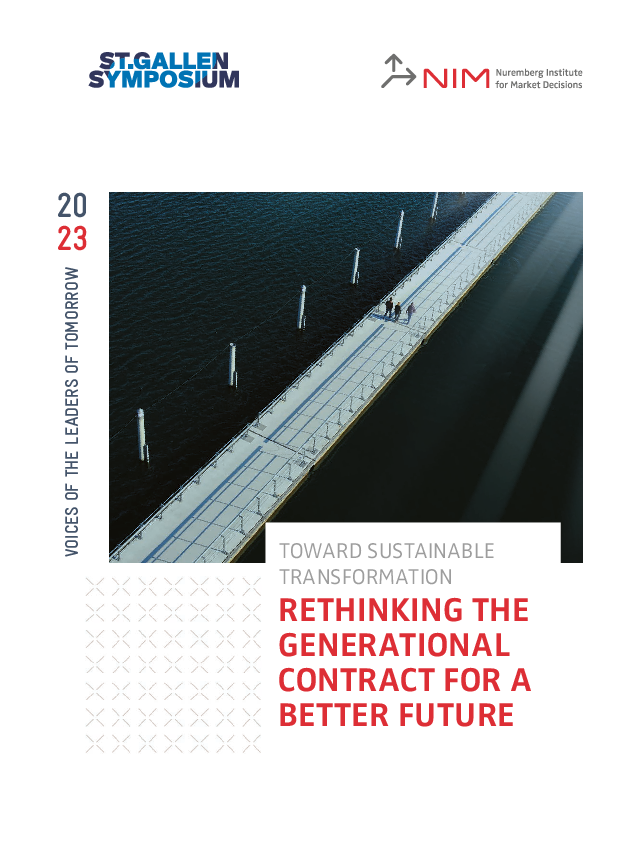Study
 Download
Download
2023
Nina Hesel,
Holger Dietrich,
St. Gallen Symposium
Toward Sustainable Transformation
Climate protection over growth?
Sustainable transformation is more important than growth, according to the next generation of leaders
Happiness does not depend on economic growth, believes Gael 23, a social entrepreneur from Côte d'Ivoire. Therefore, 62% of Leaders of Tomorrow would prioritize improving the carbon footprint faster even if it meant sacrificing wealth and growth. And what do today's top managers think? While they may also think that climate protection is generally important, only 30% of today's top managers are willing to jeopardize economic growth and wealth for a faster sustainable transformation.
[…] It requires prioritizing environmental concerns over short-term economic interests, and a long-term commitment to ensure a sustainable future.
Halvor, 27, Norway, Management Consultant, Serial Entrepreneur
Climate crisis, system crisis?
Almost half of the Leaders of Tomorrow would like to accelerate climate protection, if necessary, with drastic measures.
The Leaders of Tomorrow are not just advocating for climate protection; they're pushing for rapid progress. A significant 47% of these future leaders would even find it acceptable to bend rules and laws, to accelerate climate action. More than half, at 57%, believe our current economic and political system is not adequate for fostering sustainable business practices.
Young visionaries are advocating for a systemic overhaul. They envision a new framework where climate protection is a primary incentive, and relentless growth is no longer the sole focus. This perspective sharply contrasts with the 80% of today's top executives who maintain confidence in achieving sustainability within the existing economic model.
[…] In fact, a commitment to environmental action would require many companies and institutions to fundamentally change their business model and operations.
Elizabeth, 29, Japan, President and Co-Founder, Community Organization.
Climate protection: a matter of perception?
The generations perceive their climate commitment differently
The climate crisis reveals a stark generational divide in perceptions and engagement. An overwhelming 87% of today's top executives believe that their generation is doing enough to protect the climate, or at least is willing to do so. In contrast, only 27% of tomorrow's leaders share this optimism.
Further highlighting this divide, 56% of the Leaders of Tomorrow feel that the older generation, despite having ample resources and opportunities, is not doing enough for the climate. They even perceive that older generation is hindering climate protection efforts due to reluctance in altering comfortable lifestyles. Surprisingly, the older generation seems oblivious to this frustration among the youth, believing they share a common understanding of the climate crisis's severity. This raises a critical question: How did such a profound misunderstanding arise between the generations?
[L]eaders of today were ‘socialized‘ in a time where immediate political gains or economic interests were prioritized over the long-term goal of addressing climate change. […]
Mara, 27, Luxembourg, Social Entrepreneur
Who decides on tomorrow's climate?
No intergenerational justice in future issues
Every environmental protection decision made in business and politics can have a significant and long-lasting impact. The people who still have their future ahead of them will benefit the most - or the exact opposite. That is why two thirds of the Leaders of Tomorrow would like people from the younger age group to help make important climate decisions.
69% of Leaders of Tomorrow belief that the views of the younger generations are currently not represented in political-decision-making on an equal footing. 62% of them think that young people today are not involved enough in important business decisions. It is also interesting to note that belief in the intergenerational solidarity is surprisingly low in both groups. Among today's managers, only 36% still feel responsible towards the younger generation. Only 41% of the Leaders of Tomorrow still believe that young and old have an obligation for mutual care.
The climate crisis is not a burden my generation chose, but one we must carry if we do not want to pass it on to our own children. […]
Frankie, 25, Switzerland, Social Entrepreneur
Voluntary change or rules and market regulations?
The market alone won't steer us towards a climate-friendly economy
When it comes to climate protection, there's a rare consensus between the Leaders of Tomorrow and today's top executives: Neither the Leaders of Tomorrow nor the top executive of today seem to believe in the idea that the free market and voluntary changes in behavior will lead to sustainable change in the economy. They are unanimously of the opinion that the market must be regulated in order to promote climate protection. Today's top managers are even more pessimistic than the younger generation: 90% of today's top managers believe that regulation is more promising than leaving it to the market itself. 69% of the Leaders of Tomorrow agree. This similarity provide an opportunity for both generations to work together now.
Authors
- Dr. Fabian Buder, Head of Future & Trends Research, NIM, fabian.buder@nim.org
- Nina Hesel, Senior Researcher, NIM, nina.hesel@nim.org
- Holger Dietrich, Senior Researcher, NIM, holger.dietrich@nim.org
- St. Gallen Symposium
Contact
